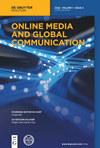有偏见,而不是懒惰:评估COVID-19错误信息策略对不准确和虚假认知的影响
引用次数: 3
摘要
摘要目的鉴于人们有更多机会遇到围绕新冠肺炎大流行的科学错误信息,本研究旨在检验不同类型的错误信息如何影响读者对信息的评价,并确定这些信息不准确和虚假评价的机制(动机推理假设与经典推理理论)。设计/方法论/方法这项研究采用了2022年3月在香港进行的一项在线实验的数据,当时第五波新冠肺炎疫情达到顶峰。数据是根据人口普查数据(N=835)按年龄确定的配额抽样收集的。调查结果一般来说,参与者无法区分被操纵的内容和被误解的内容。当被给予相反的态度信息时,那些阅读了以研究结果为支持证据的信息的人认为,与那些阅读了同一条信息但以引用作为支持证据的人相比,该信息更不准确、更虚假。相反,一个人进行分析思考和推理的倾向并没有影响对信息不准确和虚假性的评估。含义关于人们是因为认知懒惰还是因为他们想保护自己的个人信仰而容易受到错误信息的影响的争论,这些发现为动机推理假说提供了证据。媒体素养计划应确定策略,让读者注意信息处理中的个人偏见。原创性/价值尽管许多研究人员试图确定读者易受错误信息影响的机制,但这项研究区分了被误解和被操纵的内容。此外,尽管认知反射测试在西方背景下被广泛研究,但本研究在香港测试了这种倾向。未来的研究应该继续实证测试不同类型的错误信息对读者的影响,并针对发现的不同影响制定不同的策略。本文章由计算机程序翻译,如有差异,请以英文原文为准。
Biased, not lazy: assessing the effect of COVID-19 misinformation tactics on perceptions of inaccuracy and fakeness
Abstract Purpose In light of the fact that people have more opportunities to encounter scientific misinformation surrounding the COVID-19 pandemic, this research aimed to examine how different types of misinformation impact readers’ evaluations of messages and to identify the mechanisms (motivated reasoning hypothesis vs. classical reasoning theory) underlying those evaluations of message inaccuracy and fakeness. Design/methodology/approach This research employed data from an online experiment conducted in Hong Kong in March 2022, when the fifth COVID-19 wave peaked. The data were collected using quota sampling established by age based on census data (N = 835). Findings In general, the participants were not able to discern manipulated content from misinterpreted content. When given a counter-attitudinal message, those who read a message with research findings as supporting evidence rated the message as being more inaccurate and fake than those who read the same message but with quotes as supporting evidence. Contrary, one’s disposition to engage in analytical thinking and reasoning was not found to impact assessments of information inaccuracy and fakeness. Implications With respect to the debate about whether people are susceptible to misinformation because of cognitive laziness or because they want to protect their personal beliefs, the findings provide evidence of the motivated reasoning hypothesis. Media literacy programs should identify strategies to prepare readers to be attentive to personal biases on information processing. Originality/value Although many researchers have attempted to identify the mechanisms underlying readers’ susceptibility to misinformation, this research makes a distinction between misinterpreted and manipulated content. Furthermore, although the Cognitive Reflection Test is widely studied in the Western context, this research tested this disposition in Hong Kong. Future research should continue to empirically test the effects of different types of misinformation on readers and develop distinct strategies in response to the diverse effects found.
求助全文
通过发布文献求助,成功后即可免费获取论文全文。
去求助
来源期刊

Online Media and Global Communication
Communication, Media Studies, Internet Studies, International Studies, International Relations-
自引率
0.00%
发文量
0
期刊介绍:
Online Media and Global Communication (OMGC) is a new venue for high quality articles on theories and methods about the role of online media in global communication. This journal is sponsored by the Center for Global Public Opinion Research of China and School of Journalism and Communication, Shanghai International Studies University, China. It is published solely online in English. The journal aims to serve as an academic bridge in the research of online media and global communication between the dominating English-speaking world and the non-English speaking world that has remained mostly invisible due to language barriers. Through its structured abstracts for all research articles and uniform keyword system in the United Nations’ official six languages plus Japanese and German (Arabic, Chinese, English, French, Russian, Spanish, Japanese, and German), the journal provides a highly accessible platform to users worldwide. Its unique dual track single-blind and double-blind review system facilitates manuscript reviews with different levels of author identities. OMGC publishes review essays on the state-of-the-art in online media and global communication research in different countries and regions, original research papers on topics related online media and global communication and translated articles from non-English speaking Global South. It strives to be a leading platform for scientific exchange in online media and global communication.
For events and more, consider following us on Twitter at https://twitter.com/OMGCJOURNAL.
Topics
OMGC publishes high quality, innovative and original research on global communication especially in the use of global online media platforms such as Facebook, TikTok, YouTube, Twitter, Instagram, WhatsApp, Weibo, WeChat, Wikipedia, web sites, blogs, etc. This journal will address the contemporary concerns about the effects and operations of global digital media platforms on international relations, international public opinion, fake news and propaganda dissemination, diaspora communication, consumer behavior as well as the balance of voices in the world. Comparative research across countries are particularly welcome. Empirical research is preferred over conceptual papers.
Article Formats
In addition to the standard research article format, the Journal includes the following formats:
● One translation paper selected from Non-English Journals that with high quality as “Gems from the Global South” per issue
● One review essay on current state of research in online media and global communication in a country or region
 求助内容:
求助内容: 应助结果提醒方式:
应助结果提醒方式:


